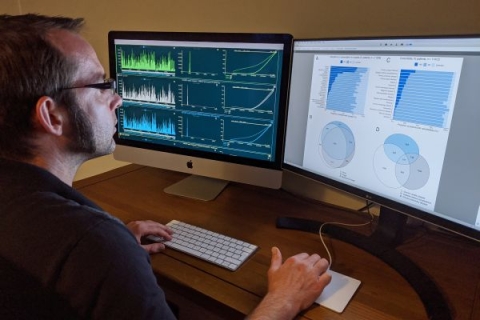

Three projects, including Dr Sam Robson's research, will share a £10,000 award, to address the challenges of Covid-19
3 June 2020
9 min read
Portsmouth, Bournemouth and Southampton universities are joining forces in a mission to address the wide-ranging challenges of Covid-19.
Innovative projects at the three south coast universities have won funding through a regional competition by the Wessex Academic Health Science Centre. The projects will share £20,000 to get their pioneering ideas off the ground.
The projects will develop ideas and solutions including fast point-of-care and home testing kits for Covid-19, a wellbeing website for paramedics, and techniques to track the genomic sequencing of the virus to understand its evolution.
Professor Peter Smith, Wessex Academic Health Science Centre committee member, said: “We had a fantastic response from all three universities to the call for funding bids and it was wonderful to see such brilliant submissions. This is a great example of Southampton, Portsmouth and Bournemouth universities working together to tackle some of the difficult challenges that Covid-19 has thrown up, and we look forward to seeing these excellent projects develop.”
Three projects will share a £10,000 award:
Sequencing and Tracking of Phylogeny in Covid-19 (STOP Covid-19): Sam Robson, Bioinformatics Lead at the Centre for Enzyme Innovation at the University of Portsmouth, is using patient samples collected at Portsmouth’s Queen Alexandra Hospital to determine whole viral genome sequences. This will allow the identification of distinct lineages of the virus that have arisen as the pandemic has developed, therefore enabling researchers to predict the future spread of Covid-19.
A 10 minute testing kit for SARS-CoV-2: Franklin Nobrega, Lecturer in Microbiology at the University of Southampton, is developing a Bluetooth-enabled sensor that will diagnose Covid-19 within 10 minutes. The testing kit would enable non-expert users to diagnose themselves, sending the results of their swab test direct to their phone via an app.
Paramedic wellbeing website: Peter Phillips, Lecturer in Paramedic Science at Bournemouth University, will use the funding to develop a wellbeing website for paramedics, whose mental health is under additional strain due to Covid-19. The website will feature a questionnaire and regular invitations to share their mood, along with motivational evidence-based comments and suggestions.
This is a great example of Southampton, Portsmouth and Bournemouth universities working together to tackle some of the difficult challenges that Covid-19 has thrown up, and we look forward to seeing these excellent projects develop.
Professor Peter Smith, Wessex Academic Health Science Centre committee member
Six additional projects will share a further £10,000. They are:
The development of an online hub to support the wellbeing and mental health of health and social care students during major incidents, led by Lisa Hyatt, Senior Teaching Fellow in the School of Health and Care Professionals at the University of Portsmouth.
Creating a virtual six-minute walk test to assess the fitness and prognosis of people recovering from Covid-19, led by Paul Gorczynski, Senior Lecturer in the School of Sport, Health and Exercise Science at the University of Portsmouth.
FoodPINNER, led by Jeff Bray, Principal Academic in Consumer Behaviour at Bournemouth University. The project will design an app that ‘pins’ food resources onto a map, including information from farmers, retail stores and individual smallholders, to combat supply problems.
A community project working with sewing clubs to produce facemasks for people working in public places such as supermarkets and pharmacies, led by Roxana Carare, Professor of Clinical Neuroanatomy at the University of Southampton.
The development of non-thermal plasma to disinfect facemasks, led by Minkwan Kim, Lecturer in Astronautics at the University of Southampton.
Establishing a contactless facemask fitting system using camera sensors to generate a 3D model of the face, led by Hansung Kim, Assistant Professor in the School of Electronics and Computer Science at the University of Southampton.
